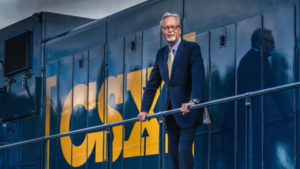LaHood upbeat about recovery, highlights role of rail in Illinois
Written by jroodU.S. Secretary of Transportation Ray LaHood talked Oct. 20 at Knox College n Galesburg, Ill., about the role of transportation in helping the local, state and national economy recover, according to The Galesburg Register-Mail. LaHood said all indicators show the country is coming out of the recession, but it won't be over until unemployment numbers drop.
LaHood, the keynote
speaker at a luncheon sponsored by the Galesburg Area Chamber of Commerce,
spoke for about 15 minutes. Much of his focus was on the importance of the
railroad to the Galesburg area.
LaHood also visited the BNSF classification
yard, spoke to Knox College students and met privately with representatives of
the National Railroad Hall of Fame and the Galesburg Regional Economic
Development Association.
Before LaHood began to
speak, Knox College President Roger Taylor thanked him for taking time "to
continue to help strengthen Galesburg as a center for railroads and railroad
history. … BNSF isn’t merely a major employer, it’s a good corporate
neighbor."
Taylor illustrated how
important the railroad is to the college by pointing out that Colorado ranks
third in providing students for Knox, behind Illinois and Missouri "because of
the railroad."
LaHood, who formerly
was a congressman from Peoria and represented a portion of eastern Knox County,
said he’s well aware of how rough the recession has been on this area.
"The people of Knox
County, and certainly Galesburg, have been sorely tested by the recession,"
LaHood said.
He complimented the area
for making the railroad a focus as the road to recovery.
"The railroad can
certainly become the economic engine to your recovery," LaHood said.
He
praised local residents for not, as he put it, sitting around in the coffee
shops and bemoaning their fate.
"In Galesburg and Knox
County, you know what your economic engine is. You know how to create jobs and
we’re (the federal government) going to help," he said.
LaHood said Illinois’
share of the American Recovery & Reinvestment Act is $9.7 billion. He said
$935 million is available to help rebuild and modernize the state’s
transportation infrastructure.
With Amtrak Chairman Tom
Carper, the former mayor of Macomb, in attendance, LaHood mentioned money that
will be used to improve the Galesburg Amtrak depot. He talked about President
Obama’s high-speed rail initiative and said, "I know passenger rail and Amtrak
have been the lifeblood of Knox County and Knox College," as well as Macomb and
Western Illinois University, and Bloomington-Normal and Illinois State University.
"Passenger and freight
rail transportation are closely linked," he said. "People and goods use the
same infrastructure to travel on."
Federal stimulus money
of about $88.5 million will be used to build a third main rail in the BNSF
yards, as well as storage tracks, which will help Amtrak’s on-time performance.
Some federal money also will help build two railroad overpasses and one
underpass.
LaHood talked briefly
about a national rail plan being developed, which should be in place this
winter.
"On passenger rail, I
think the lesson is, people will come; if you build a light rail system, people
will use it. In America, people are getting tired of being stuck in traffic for
an hour and a half (although he acknowledged that’s not a problem in
Galesburg). We need to offer people opportunities for all forms of
transportation.
"They’ve made a huge
investment in high-speed rail in Europe and Spain," he said, recounting a ride
on a train traveling 250 mph in Spain that, if it was late arriving, all
passengers received their money back.
LaHood was upbeat for the
most part.
"The Recovery Act is responsible for creating or saving one
million jobs with one million jobs in the pipeline," he said. On a number of
occasions, he said, "This is America, we can do this.
"We need to get America
back to work, that’s our number one priority. I’m optimistic about this," he
said. "Galesburg is coming back, Knox County is coming back and America will,
too."





